Earlier today, Greenpeace activists inflated a giant ghost octopus, which measured up to 14 meters from the tip of its head to the end of its tentacles, in front of the Czech Ministry of Industry and Trade in Prague to protest against deep sea mining. It was accompanied by a large banner „The seabed is my home. Don’t destroy it“. The recently discovered ghost octopus was chosen by Greenpeace for its protest against mining as it represents the uniqueness of animal species that live on the seabed at great depths.

Greenpeace was drawing attention to the dangers of the newly emerging destructive deep sea mining industry that even large multinational companies such as Google, BMW have vowed not to support. Czech Minister of Industry and Trade Jozef Sikela and his subordinates may be instrumental in stopping deep sea mining, as the Czech Republic has a representative on the Council of the International Seabed Authority (ISA). Greenpeace is demanding that the Czech Republic send a representative to the ISA Council meeting in Kingston, Jamaica and vote in favour of a moratorium on deep sea mining. Greenpeace’s appeal, which calls for a halt to deep-sea mining, has already been signed by over 25,000 people from the Czech Republic. A representative of the Ministry of Industry and Trade Pavel Kavina was also present and took up Greenpeace’s demands.
The next ISA meeting is in Kingston, Jamaica, and will address whether the world community will allow deep sea mining to begin. In July, an ultimatum to set regulations for this emerging industry expires, so companies could start applying to the UN for permission to develop commercial projects as early as July. According to Greenpeace, it is crucial that the world’s countries – including the Czech Republic – impose a moratorium on deep-sea mining.
Although there are no rules and regulations for this new industry, mining companies are pressuring governments with a controversial legal loophole that gives them only two years to assess the risks and opportunities of deep-sea mining and set any regulations. This process was initiated in 2021 by the President of Nauru. Given that states did not agree on any restrictions on deep-sea drilling at the last ISA meeting this April, they may consider and possibly approve any deep-sea drilling application any time after 9 July.
Scientists and indigenous activists in the affected areas have warned against deep-sea mining. Some countries, such as France, Spain, Germany, Chile and New Zealand, are speaking out against deep-sea drilling and calling for a ban or at least a temporary moratorium, while others are joining the initiative. The Czech Republic’s position on deep-sea mining is still unclear, and the Czech delegation did not take an active role in the last meeting and remained silent.
